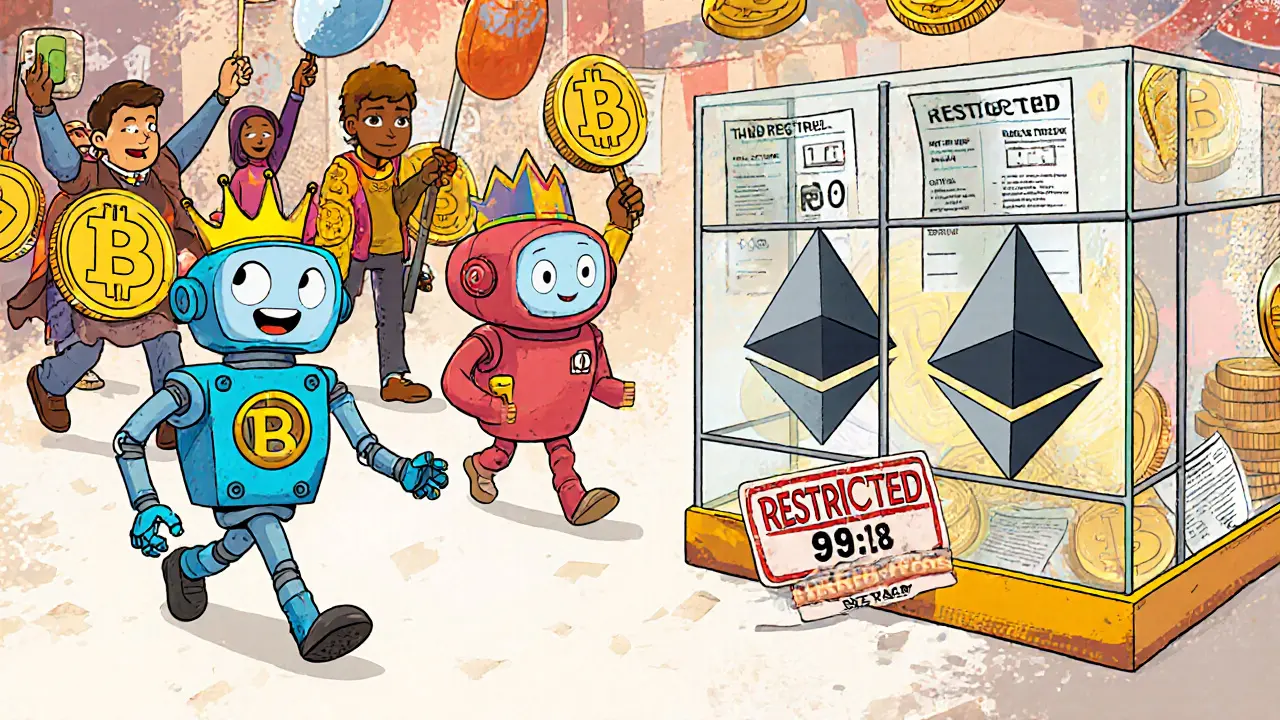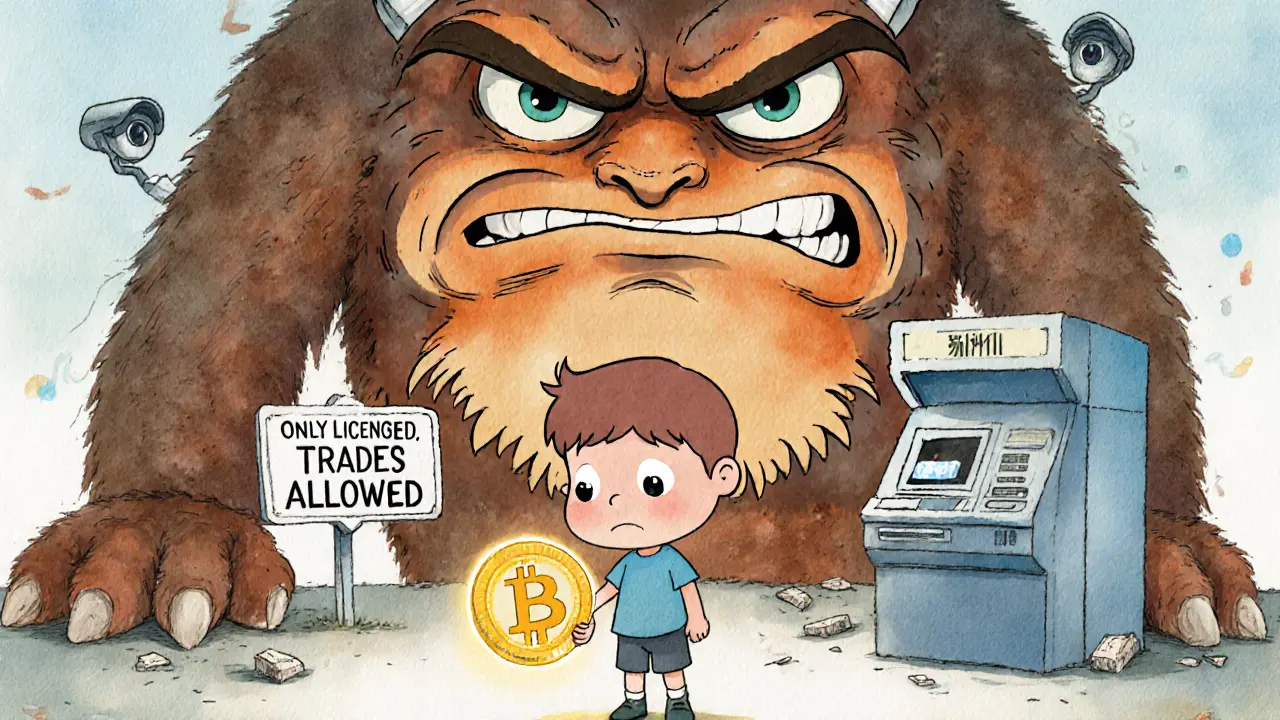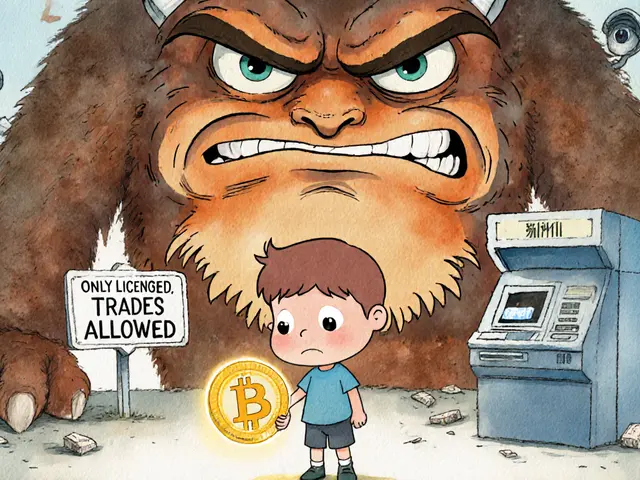Is crypto regulated in Iran? The answer isn’t simple. It’s not fully legal, not fully banned - it’s controlled. In 2025, Iran has one of the most tightly monitored cryptocurrency environments on the planet, where the government allows trading only under strict conditions, monitors every transaction, and punishes unauthorized activity. If you’re trying to use crypto in Iran, you’re not just dealing with market volatility - you’re navigating a state-run system designed to track, tax, and limit your access.
Iran’s Crypto Rules Are Built on Sanctions and Survival
Iran’s relationship with cryptocurrency didn’t start because people loved Bitcoin. It started because the country was cut off from the global banking system. After years of U.S. and UN sanctions blocked access to SWIFT, Iranian businesses and citizens turned to crypto to buy essentials, send money abroad, and protect savings from hyperinflation. By 2020, Iranians were trading $16-20 million in crypto every day. The government didn’t stop them - it watched. And then it stepped in.In 2024, the Central Bank of Iran (CBI) made a major move: it cut off all direct links between crypto exchanges and Iranian rial accounts. That meant you could no longer buy Bitcoin with cash from your local bank. The goal? Bring crypto under state control. By January 2025, President Masoud Pezeshkian signed a new directive that made the CBI the only legal authority for crypto regulation. Now, every exchange, miner, and trader needs a government license - and every transaction flows through a government-approved gateway.
You Can’t Trade Crypto Freely - Even If You Have the Money
The rules are clear, but they’re also constantly changing. Here’s what’s allowed - and what’s not - in 2025:- Buying crypto with rials? Only through government-licensed exchanges like Nobitex. You must verify your identity, and the process can take 3-5 days.
- Mining Bitcoin? Legal only if you sell all your coins directly to the Central Bank. Most miners went underground because energy prices for licensed operations are too high to profit.
- Using stablecoins like USDT? You can hold up to $10,000 and buy no more than $5,000 per year. Any more, and you risk having your wallet frozen. Tether froze over 40 Iranian-linked addresses in July 2025, and the government didn’t stop it.
- Advertising crypto? Completely banned. No ads on social media, billboards, or websites. Even mentioning crypto in public posts can get you flagged.
These aren’t suggestions. They’re laws. And enforcement is growing. The CBI has full access to every transaction record. If you’re trading on an unlicensed platform, you’re not just breaking rules - you’re leaving a digital trail the state can use against you.
The State Has Its Own Crypto - And It’s Not Bitcoin
While Iran restricts Bitcoin and Ethereum, it’s pushing its own digital currency: the Rial Currency. Unlike Bitcoin, it’s not decentralized. It’s not mined. It’s not anonymous. It’s just an electronic version of the Iranian rial - controlled entirely by the Central Bank.The government plans to expand Rial Currency to everyday payments by mid-2026. Why? Because it can track every purchase, stop black-market spending, and avoid the risk of foreign crypto undermining its monetary control. It’s a digital wallet that answers to Tehran - not to users.
This creates a strange duality: Iran lets people use foreign crypto to bypass sanctions, but only if the government can see it. Meanwhile, it builds its own system to replace it entirely.

How Iranians Are Working Around the Rules
Despite the restrictions, crypto use hasn’t disappeared - it’s just gone underground. Around 60% of crypto trading in Iran now happens through unofficial channels, according to Chainalysis. Here’s how people are getting around the system:- VPNs and foreign exchanges: Many Iranians use VPNs to access Binance, Kraken, or Coinbase. But this is risky - the government can detect VPN use and may block accounts.
- Switching from USDT to DAI: After Tether froze Iranian wallets, users rushed to DAI, a decentralized stablecoin on the Polygon network. DAI doesn’t answer to any company, so it’s harder to freeze.
- Peer-to-peer trades: People meet in person or use Telegram groups to swap crypto for cash, avoiding exchanges entirely.
One Reddit user in October 2025 wrote: “The new system adds 3-5% fees, but at least I don’t wake up to find my account frozen.” That’s the trade-off: slower, more expensive, but more predictable.
Taxes, Fines, and the Risk of Sanctions
In August 2025, Iran introduced its first crypto capital gains tax. Now, profits from trading Bitcoin or Ethereum are taxed like real estate or gold. The Ministry of Economic Affairs plans to link crypto tax reports to existing financial systems by mid-2026. If you made $10,000 from crypto last year, you owe taxes - and the government knows it.There’s also a bigger threat: international sanctions. When Tether froze Iranian wallets, it wasn’t just a business decision - it was pressure from the U.S. Treasury. If Iran’s crypto system is seen as helping evade sanctions, more banks and platforms will cut ties. Economists warn that if the Central Bank is linked to illicit activity, Iran could face even harsher penalties.
Some experts think Iran’s approach is smart - it brings crypto into the light so it can tax it, track it, and control it. Others say it’s self-sabotage. By making crypto so hard to use legally, the government pushes people toward riskier, unregulated channels - and loses control anyway.

What Does This Mean for You?
If you’re in Iran and want to use crypto in 2025, here’s what you need to know:- Don’t trust unlicensed exchanges. They’re not protected - and your money could vanish overnight.
- Stay under the $10,000 stablecoin limit. Go over it, and you’ll be forced to sell or risk freezing.
- Use DAI instead of USDT if possible. It’s harder for companies to block.
- Expect delays. Account approvals, support replies, and transaction confirmations take days - not hours.
- Don’t advertise crypto. Even sharing a link on Instagram could get your account shut down.
The bottom line: crypto in Iran isn’t about freedom. It’s about survival - and the state is the only one who gets to decide how much you can have, how you can use it, and when you lose it.
What’s Next for Crypto in Iran?
By 2026, Iran will likely phase out most decentralized crypto for everyday use, replacing it with the Rial Currency. Mining will remain restricted to state-approved operations - if they exist at all. The market may shrink further: TRM Labs reports a 11% drop in crypto inflows in the first half of 2025.But if global sanctions ease - say, through a new nuclear deal - Iran could suddenly loosen restrictions. Until then, crypto here isn’t an investment. It’s a high-stakes game of cat-and-mouse with your own government.
Is cryptocurrency legal in Iran in 2025?
Cryptocurrency is not illegal in Iran, but it is heavily regulated. Only government-licensed exchanges can operate, and all transactions must go through state-controlled payment gateways. Individuals can trade crypto, but only if they comply with strict limits on stablecoins, mining, and trading volume.
Can I buy Bitcoin in Iran?
Yes, but only through government-approved exchanges like Nobitex. You must complete identity verification, and you cannot buy Bitcoin directly with rials from your bank. Most people use peer-to-peer trades or foreign exchanges via VPNs, but those methods carry legal risk.
What is the $10,000 limit on stablecoins?
In September 2025, Iran’s Central Bank imposed a $10,000 maximum holding limit and a $5,000 annual purchase cap on stablecoins like Tether (USDT) and DAI. This applies to both individuals and businesses. Exceeding the limit requires selling excess coins, and failure to comply can result in frozen wallets.
Why did Tether freeze Iranian crypto wallets?
Tether froze 42 Iranian-linked addresses in July 2025 after pressure from U.S. financial regulators. These wallets were tied to Iranian exchanges like Nobitex and were suspected of facilitating transactions that bypassed international sanctions. The freeze was part of broader compliance efforts by U.S.-based crypto firms.
Is mining Bitcoin allowed in Iran?
Mining is legal only if you sell all your mined coins directly to the Central Bank of Iran. The government sets energy prices so high for licensed miners that most cannot profit. As a result, many miners operate illegally, risking fines or equipment seizure.
Does Iran tax cryptocurrency profits?
Yes. Since August 2025, Iran has imposed a capital gains tax on cryptocurrency trading, treating profits like those from real estate or gold. The Ministry of Economic Affairs plans to integrate crypto tax reporting into the national financial system by mid-2026.
What is the Rial Currency digital coin?
The Rial Currency is Iran’s official central bank digital currency (CBDC), launched in 2018. Unlike Bitcoin, it is centralized, non-minable, and fully controlled by the Central Bank. It is designed to replace paper rials for digital payments and is not intended for international trade or speculation.
Can I use a VPN to trade crypto in Iran?
Yes, many Iranians use VPNs to access foreign exchanges like Binance or Kraken. However, the government can detect and block VPN traffic, and using them to trade crypto may violate local regulations. While enforcement is inconsistent, users risk account freezes or legal consequences if caught.


DeeDee Kallam
November 3, 2025 AT 23:34why is everyone acting like this is new?? i’ve been using dais since 2022 and my wallet’s never been frozen… just don’t be dumb and keep it all in one place. also stop talking like iran is some kind of crypto dystopia-it’s just capitalism with extra steps.
alvin Bachtiar
November 4, 2025 AT 21:55Let’s be real: the CBI didn’t ‘step in’-they saw a black market thriving and said, ‘Cool, we’re taking a cut.’ This isn’t regulation, it’s rent-seeking with a blockchain veneer. And yes, Tether froze those wallets because the U.S. told them to. Not because of ‘compliance.’ Because geopolitics is just finance with more flags. 💸🔥
Genevieve Rachal
November 6, 2025 AT 00:32People who think this is ‘survival’ are delusional. If you’re using crypto to dodge sanctions, you’re not a victim-you’re an enabler. And the fact that Iranians are switching to DAI instead of USDT? That’s not innovation. That’s desperation wearing a crypto hoodie.
Debby Ananda
November 7, 2025 AT 18:17Wow. So Iran’s basically building a crypto panopticon. 🤯 I mean… it’s beautiful in a dystopian, Kafkaesque way. Like, imagine your wallet has a LinkedIn profile. ‘Status: Compliant. Transaction History: Public. Trust Score: 78/100.’
Malinda Black
November 8, 2025 AT 11:30It’s sad, but also understandable. When your currency is collapsing and your bank is blocked, you don’t get to pick the tool-you pick the only thing that works. The state’s response isn’t evil-it’s terrified. They know if crypto becomes truly decentralized, their control evaporates. That’s why they’re pushing the Rial Currency. Not to help people. To survive.
Jessica Hulst
November 10, 2025 AT 00:03Let’s pause for a second and ask: who really benefits from this? The people? Or the regime? The answer is obvious. This isn’t about financial sovereignty-it’s about political sovereignty. Crypto, by its nature, resists control. Iran’s move isn’t regulation-it’s a counter-revolution disguised as policy. The Rial Currency? It’s not a currency. It’s a leash. And the fact that they’re taxing gains like real estate? That’s not fiscal policy. That’s confession. They’re admitting crypto is here to stay. So now they’re trying to domesticate it. Like a wild animal. With a muzzle.
Josh Serum
November 10, 2025 AT 03:52Look, I get it. Sanctions suck. But you can’t blame the U.S. for Tether freezing wallets. Tether’s a private company. They follow the law. If Iran wants to use crypto without consequences, maybe they shouldn’t be helping rogue states bypass global finance. Also, mining? If your energy costs are too high, maybe you’re just bad at business. Don’t cry about it.
Chris Strife
November 10, 2025 AT 14:18This is why America needs to stop being soft. Iran uses crypto to fund terror. The CBI isn’t regulating-it’s laundering. And people here act like it’s some kind of tragic hero story. It’s not. It’s a criminal enterprise with a central bank. End of story. No more ‘understanding.’ Just sanctions. Harder.
Nadiya Edwards
November 11, 2025 AT 08:41So let me get this straight… Iran lets people use crypto to survive… but punishes them for using it? That’s not a policy. That’s psychological warfare. They want you to be dependent on their system but terrified of it. And the worst part? It’s working. People are too scared to move more than $5k. They’re playing by the rules. And that’s exactly what the regime wanted.
Eli PINEDA
November 12, 2025 AT 18:35wait so if i use a vpn to buy btc on binance and then send it to a friend who meets me in a park to give me cash… is that illegal? or just ‘unlicensed’? also why is no one talking about how this is basically the world’s first crypto black market with a government tax collector?
Elizabeth Melendez
November 12, 2025 AT 22:34Y’all are missing the real story here. The fact that Iranians are using DAI instead of USDT? That’s huge. It means they’re learning. They’re adapting. They’re not just surviving-they’re evolving their crypto literacy. And honestly? That’s the most powerful thing here. The state can track every transaction, but they can’t control the *thinking*. People are choosing decentralized over centralized because they get it. And that’s scary for any regime.
Vicki Fletcher
November 14, 2025 AT 07:39Wait-so the government allows mining… but only if you sell to them? And the energy prices are so high you can’t profit? That’s not regulation-that’s a tax disguised as a policy. And they call it ‘control’? It’s theft. They’re taking your hardware, your electricity, your time-and giving you nothing but a ledger entry. And you call that a ‘legal’ system? No. That’s extortion with a website.
Phil Higgins
November 15, 2025 AT 03:30There’s a quiet revolution here, and most people aren’t seeing it. Iran isn’t fighting crypto-it’s learning from it. The Rial Currency? It’s not a rejection of decentralization. It’s an admission that digital money is inevitable. So they’re building their own version. Not because they love control. Because they fear chaos. And honestly? That’s not evil. It’s human. The question isn’t whether this is right. It’s whether we can find a way to let people survive without turning every transaction into a political act.
ISAH Isah
November 16, 2025 AT 19:12The Iranian government is not unique in this approach it is simply applying the same logic as any sovereign state when faced with disruptive technology the world has seen this before with cash smuggling with digital banking with encrypted communication the difference is that crypto is harder to contain and that is why the response is so intense it is not about ideology it is about power and power does not yield easily
Eliane Karp Toledo
November 17, 2025 AT 00:06Okay but what if the whole thing is a psyop? What if the CBI is actually a CIA front? What if the Rial Currency is already embedded with tracking chips and the ‘$10k limit’ is just to make people think they have freedom? I’ve seen documentaries. They’re not just monitoring transactions-they’re harvesting biometric data through wallet apps. They’re building a global surveillance prototype. And we’re all just watching. 😳
Bhavna Suri
November 18, 2025 AT 13:06This is too complicated. I just want to know: can I buy Bitcoin or not? Why do you write so much? It is not a novel. Just answer the question.
Ron Cassel
November 20, 2025 AT 05:02And yet… here’s the truth nobody wants to admit: if Iran didn’t have crypto, their economy would’ve collapsed by 2022. This isn’t about freedom. It’s about the fact that 15 million Iranians are using crypto to feed their families. The government doesn’t like it. But they need it. So they control it. That’s not tyranny. That’s pragmatism. You want to call it evil? Fine. But ask yourself-what would you do if your currency was worthless and your banks were locked?
Helen Hardman
November 20, 2025 AT 10:16I just want to say-this is one of the most fascinating case studies in modern finance. Imagine: a country that’s been cut off from the world uses decentralized tech to stay alive… then turns around and tries to weaponize it. It’s like watching a dragon learn to ride a bicycle. The tension between individual freedom and state control? It’s playing out in real time. And honestly? The fact that people are switching to DAI instead of USDT? That’s not just a workaround-it’s a quiet act of rebellion. And that? That’s beautiful. We need more of that kind of resilience in the world. Keep going, Iran. You’re doing something real.